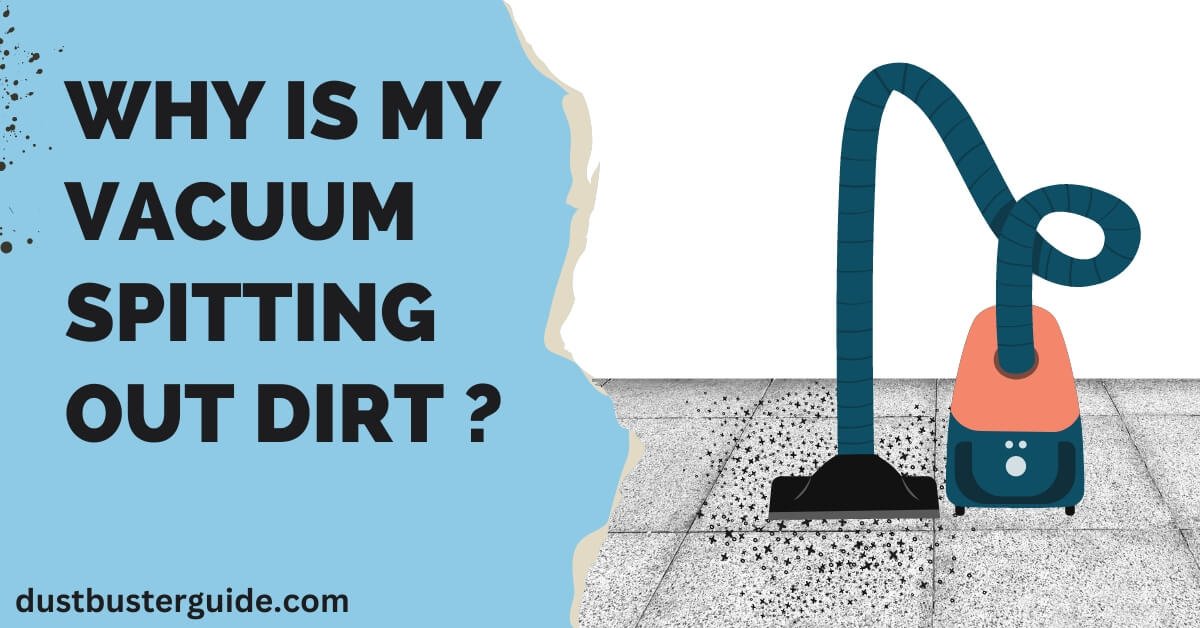Ever caught your vacuum in the act of a dusty rebellion and wondered, why is my vacuum spitting out dirt? Today, we’re diving into the mystery of a misbehaving cleaning companion. Picture this: your vacuum, supposed to suck in dirt, doing quite the opposite.
But before you declare a vacuum mutiny, here’s the scoop – a vacuum spitting out dirt can be a sign of issues like a clogged filter, a full dustbin, or even a malfunctioning motor. Join us on this troubleshooting journey as we decipher the reasons behind the rebellious act and explore the steps to restore your vacuum to its dirt-devouring glory.
Get ready to transform your vacuum from a dirt distributor back into the efficient cleaning hero it’s meant to be!
What Are The Side Effects Of Vacuum Cleaner Spitting Out Dirt
Before discussing the causes of why is my vacuum spitting out dirt and how to cure it. It is important to understand why you must solve this issue. You must solve the problem of your vacuum spitting out dirt since having clean floors is essential to maintaining good health. If your vacuum continually spits out dirt rather than cleaning it, it is clear that this differs from what vacuum cleaners intend to do.
Also, vacuum cleaners release microbes and fine dust particles into the air. In that case, they may trigger allergies and spread illnesses that may be dangerous for some elderly and infants in your house. It can also be fatal for any asthmatics living in your house. It’s also crucial to be aware that vacuum dust might contain clostridium botulinum, a toxin that can cause infant botulism.
Additionally, you should be aware that botulism can weaken the breathing muscles, which can cause difficulties breathing and possibly death. So you must gear yourself up to take action against your vacuum spitting dirt.
How To Stop Your Vacuum From Spitting Out Dirt
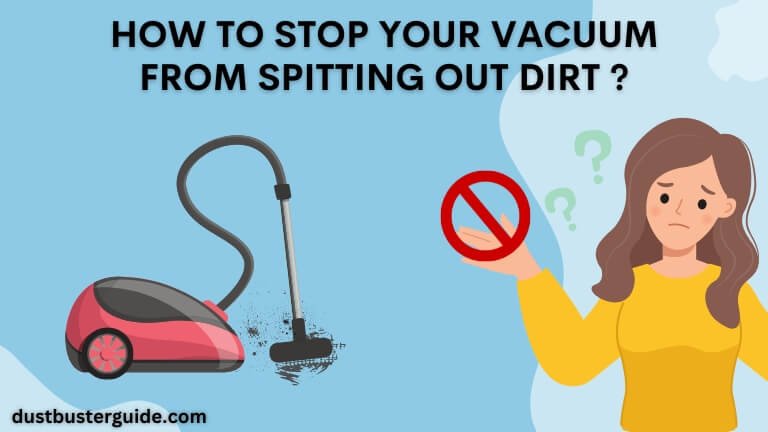
Given that you are aware of how crucial it is to prevent your vacuum from spitting out dirt, let’s explore some of the reasons that are the answer to your question why is my vacuum spitting out dirt. You must find a clog and remove it to fix your vacuum. It’s also crucial to take into account what initially triggered the obstruction.
Unclean filters and debris like toothpicks and bobby pins can build up and cause clogs. Another explanation is insufficient airflow in the roller brush because it is overloaded with hair and cannot draw the trash in.
The main reasons for your vacuum spitting out dust are some of the ones we’ve listed here, along with fixes. So let’s get started:
Why Is My Vacuum Spitting Out Dirt – 7 Reasons
A vacuum cleaner can spit out dirt or blast out dust for several reasons, regardless of the brand, whether it is Dyson or Bissell. Here is a more thorough explanation of each reason:
- Full Vacuum Bag/Tank or Dirty Filters
- Clogged Filter
- Clogged Vacuum Head
- Clogged Suction Hose
- Damaged Belt
- Spraying Mode On
- Reversed Vacuum Plug
Full Vacuum Bag/Tank Or Dirty Filters
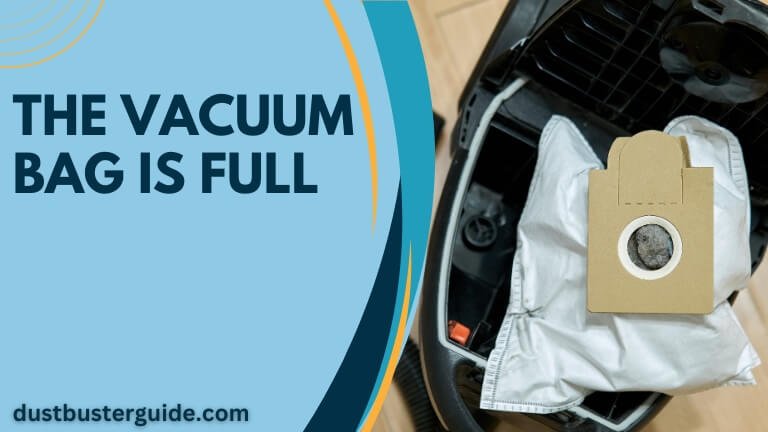
Depending on the brand of vacuum cleaner you have, the first thing you should do if your vacuum is blowing dust is to make sure the dirt-holding tank or replaceable vacuum bag isn’t full. A full bag or tank may result in decreased airflow, which will cause your vacuum to spit out debris.
The other issue with your vacuum’s canister or bag that could result in it spitting out dirt is if the bag needs to be properly fitted. If you have not correctly fastened the bag, the foul air sucked into the vacuum cleaner will pass through the device and then escape, carrying all the dirt back into the freely circulating interior air. You must resolve this issue. The same issue will occur if the bag is significantly harmed and incapable of containing the debris.
Clogged Filter
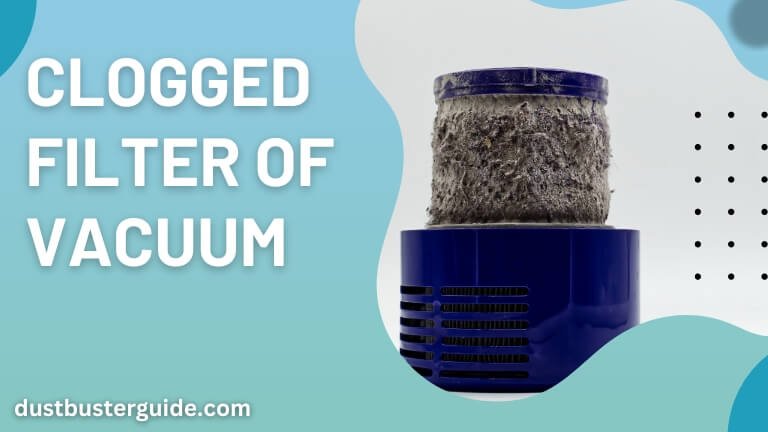
If the bag is not the problem and again a thought troubles your mind that why is my vacuum spitting out dirt, know that the clogged filter can be the reason. The vacuum cleaner’s HEPA filter is prone to clogging. For your vacuum to produce clean air, you must thoroughly clean the filter. The vacuum will release dirty air if the filter is dirty.
Look at the label to determine whether the filter is washable or permanent. If it is not washable, doing so will harm the fibers that trap the dangerous elements. If the filter is washable, rinse it with water to eliminate all the dust and ensure it is well-cleaned.
Clogged Vacuum Head
We can see that your filters are clean and your vacuum bag or tank is empty, but you’re still perplexed as to why is my vacuum spitting out dust? When that happens, it’s time to inspect your vacuum head for clogs. There are two possibilities for this:
- Vacuums that have easily detachable parts
- Vacuums that do not have easily detachable parts
Vacuums That Have Easily Detachable Parts
Take apart the vacuum head, which is the component that rolls along the floor when it is in use. The parts of modern vacuums, such as Bissell or Dyson upright vacuum cleaners, are easily accessible and allow thorough cleaning and maintenance. Take out any hair, dust, or dirt that could obstruct airflow, then put everything back together to check if the issue has been fixed. Removing accumulated dust will instantly fix the problem in nine out of ten cases, and your vacuum is set to make your home tidy again.
Vacuums That Do Not Have Easily Detachable Parts
Older vacuums might not disassemble as quickly as more recent versions. It might be more difficult to clean out the cleaner head (the portion of an older vacuum that rolls around the floor when it’s in operation). If that’s the case, try visually checking the cleaner head for any obstructions you can clear, and if necessary, consult the manual for more unclogging techniques.
Clogged Suction Hose
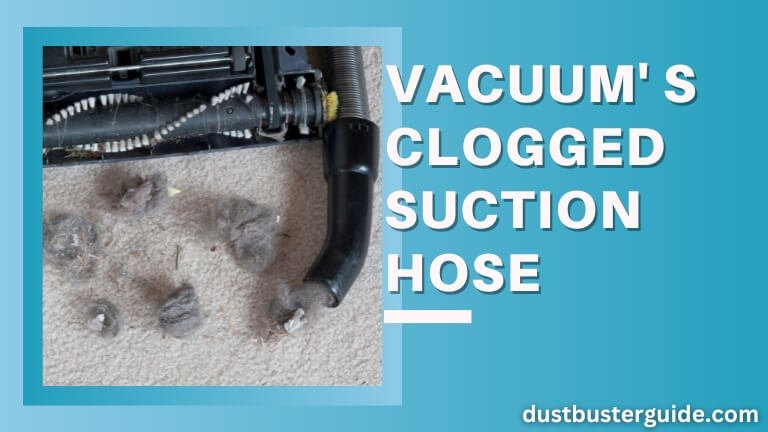
We can see that you are a husband who is currently in trouble because despite having addressed all three of the above causes, your issue persists, and your wife is yelling at you, why is my vacuum spitting out dust? Then don’t be concerned; we are here to save you. If you’ve tried the solutions listed above and your vacuum is still not working properly, you should look for any potential obstructions in the vacuum’s hoses. In a vacuum hose, particles can occasionally become clogged.
Remove the vacuum hose, place one end near a window or bright area, and look through it to see if this is the source of your problem. If you cannot see through the hose, something is jammed inside. You’ll need to use some tools to unclog the hose.
Tip: Find a common household item that works well for squeezing down that long tube in removing dirt from vacuum hoses, such as:
- A broken metal hanger
- Measuring tape made of metal
- A dowel rod of the correct size
- A fishing pole
Damaged Belt
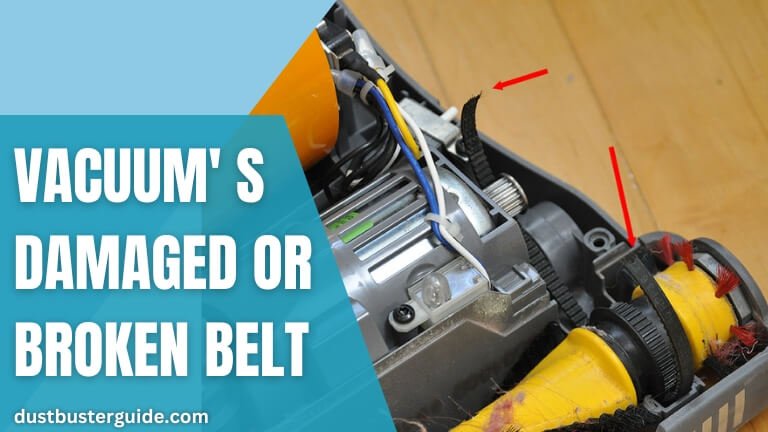
A damaged belt prevents the vacuum from operating properly. The mechanics of most vacuums demand a belt to revolve the vacuum’s roller or brush bar (or bars, depending on your specific model). If the dirt is still coming out of your vacuum, turn it on and examine if the roller or brush bars are spinning.
A broken belt may cause your roller or brush bars not to roll. If you’re not skilled, you might need to order a belt, go shopping for a replacement belt, or bring the vacuum to a repair shop. The good news is that vacuum belts and repairs for vacuum belts are reasonably priced. So what are you waiting for? If you have determined that the belt in your vacuum is to blame, throw it away and get yourself another belt.
Spraying Mode On
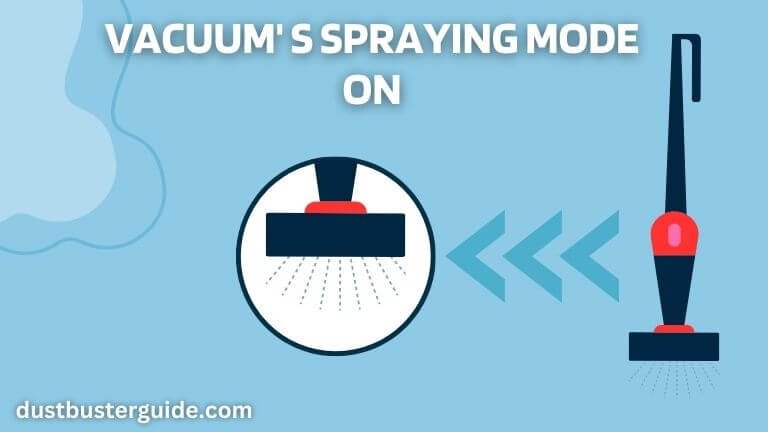
There are a few vacuum cleaners on the market that you can use to spray paint or water. Combination machines are the name given to these vacuums. This kind of vacuum cleaner may be in spray mode rather than vacuum mode, which would explain why it’s spitting out dirt. If this is the issue, you can solve it by simply changing it to vacuum mode.
Reversed Vacuum Plug
Your vacuum cannot draw in any air. Thus it must be spitting dirt. This issue might arise when the vacuum is plugged in backward or when the vacuum’s electric motor is plugged in backward. If so, try plugging the vacuum cleaner in another direction to see if that fixes the problem.
| Reason | Description |
|---|---|
| Full Vacuum Bag/Tank | When the vacuum bag or tank is full, it can lead to poor suction and dirt being pushed back into the air. Regularly emptying the bag/tank is important. |
| Dirty Filters | Dirty filters can reduce airflow and cause the vacuum to expel dirt. Clean or replace filters as needed. |
| Clogged Filter | If the filter is clogged, it can disrupt airflow and cause dirt to be forced out. Clean or replace it. |
| Clogged Vacuum Head | A clog in the vacuum head or brush roll can lead to poor suction and dirt being blown out. Clear any obstructions. |
| Clogged Suction Hose | A clog in the suction hose can cause dirt to be pushed out. Check and clear any blockages in the hose. |
| Damaged Belt | A damaged or loose belt can affect the brush roll’s rotation, resulting in dirt being scattered instead of sucked in. Replace the belt if needed. |
| Spraying Mode On | Some vacuums have a spraying mode for cleaning solutions. Make sure it’s turned off, as it might expel dirt if turned on. |
| Reversed Vacuum Plug | If the vacuum plug is inserted incorrectly, it could result in the vacuum blowing out dirt instead of sucking it in. Double-check the plug’s orientation. |
Other Needed Repairs
Nearly all of the causes of vacuum spitting dust are listed above. If you’ve tried them all and your vacuum is still giving you trouble, there may be repairs that there is something that you need to repair in your vacuum. Unfortunately, this leaves you with the difficult choice of taking your vacuum to a repair shop so that a technician can look it over and try to fix it or buy a new vacuum. There are again two instances:
- Newer Vacuum Model
- Older Vacuum Model
Newer Vacuum Model
It is helpful to contact the manufacturer if your vacuum is a more recent model. Given how recently you’ve bought and used the vacuum cleaner, your vacuum may still be covered by its guarantee, making repairs either free or less expensive. Given the price of vacuums, it makes sense to pay a professional vacuum repair company to fix the issue if the manufacturer cannot.
Older Vacuum Model
As regrettable as it may sound, older vacuum cleaners could just be nearing the end of their lifespan. In this situation, consider forgoing the trip to the vacuum repair shop to purchase a new vacuum.
How To Prevent Vacuum From Spitting Dirt In The First Place
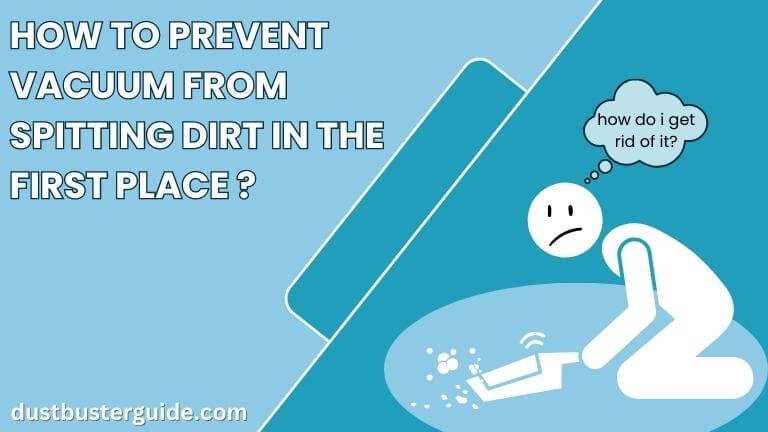
You now know why the vacuum is spitting dirt out and how to fix it, but it will be amazing if we stop it before it starts. We are now here for your guidance. Two things virtually always work to prevent vacuum problems:
- Using an empty canister or bag to vacuum
- Avoid sucking up anything big or small, wet or large (clogs the vacuum), or wet and huge (e.g. drywall dust with a non-Shop Vac)
What have we discovered so far? Before you vacuum, always check the canister or bag to see if it is half-full or empty (bag). When full, it cannot suck as well, heats the motor more quickly (which could lead to it burning out), and requires more effort from you. It’s time to empty the vacuum if you notice a strange fragrance. Second, before turning on the vacuum device, inspect the floor and remove any large objects like paper clips, coins, small toys, socks, etc., to prevent a blockage from forming.
A Few Notes On Vacuum Clogs – Preventive Measure
Since you are probably already well aware of the issues raised above when vacuuming, here are a few things you should know to keep your vacuum in good working order:
- You don’t want to risk damaging the vacuum or hurting yourself, so don’t do anything you are not at ease doing.
- A vacuum should be very simple to disassemble; if you push, pull, or twist something too much, it will break. You’re not doing it correctly if you have to push anything to move. Stop immediately and attempt a different approach because vacuum repairs are expensive and inconvenient.
- Remember that the clog might be some of your important things, so check it before throwing it away.
Since we’re talking about vacuums, here’s another vacuum-related problem that most people are worried about and that we frequently get asked about. Let’s deal with it now.
Why Is My Vacuum Clogged When The Bag Is Not Full?
If your vacuum is experiencing clogs even when the bag is not full, several factors may be contributing to this issue.
Firstly, check the filters in your vacuum, as clogged filters can impede airflow and cause obstructions. Cleaning or replacing the filters, following the manufacturer’s instructions, can alleviate this problem.
Additionally, inspect the hose and wand for any blockages that might be hindering the suction power. Larger debris, hair, or strings can accumulate in these parts and lead to clogs.
Ensure the brush roll or beater bar at the base of the vacuum is free from tangles and debris, as blockages in this area can affect the vacuum’s performance.
Finally, examine the entire air pathway, including tubing and attachments, to clear any potential obstructions. By addressing these areas, you can improve the vacuum’s efficiency and prevent clogs even when the bag is not full.
Why Is My Vacuum Blowing Out Hot Air Or Smoke
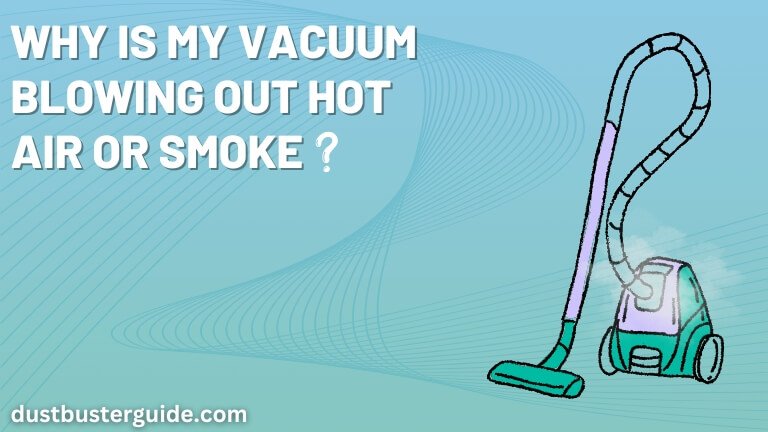
The question why is my vacuum spitting out dirt is followed closely by why is my vacuum blowing out smoke. So let’s investigate why.
Having a little heat is fine as long as it doesn’t affect how well a vacuum cleaner works. However, it is cause for alarm if one notices excessive heat emission or the machine’s body heating. Some consumers claim that the vacuum cleaner grows so hot that even touching its body is difficult.
It indicates that the motor has burned out or that the vacuum is overheating and that there may, at worst, be an electrical problem (fire). Make a 911 call immediately and move to safety if there is a fire. When the motor of an older vacuum cleaner starts to burn out, you might notice the smell of burned plastic or wires and, eventually, smoke. An overworked motor will often display signs of overheating. The vacuum cleaner can prevent burning or smoke with an automated shut-off option.
Have the motor checked out and repaired by a licensed vacuum cleaner repair facility if that is the issue. Additionally, if the canister and filter are clogged with debris, this may be a problem. Therefore, it is crucial that you routinely clean the interior components of your vacuum. Moreover, remove hair, dirt, and debris from hoses, attachments, and brushes. It should restore things and allow for improved airflow.
Conclusion
We hope this post has helped you find an answer to your question, why is my vacuum spitting out dirt as well as find the solutions to your vacuum-related problem. There are several causes for the vacuum to start spitting out dust instead of sucking it in, but as we have seen, clogging is the main one. The vacuum itself may become clogged, as well as its filters, hose, vacuum head, or other components. Always check that your vacuum cleaner’s bag, canister, and filter are clean before using it. If the problem has proven too difficult to solve, get your vacuum repaired by a professional or consider buying a new one.
FAQs
Should I spend on getting my vacuum cleaner repaired?
We advise against having your vacuum cleaner repaired because it is not cost-effective to do so after 5-7 years. Certain vacuum cleaners should, nevertheless, be repaired as necessary, especially if the work is simple.
Are HEPA filters good to use in case of clogging?
Like any other filter, HEPA filters are susceptible to clogging. You must regularly clean the vacuums and more frequently if you have pets or young children living in your home.
How do I stop my shop vac from blowing dust?
Shake off the dust from the filter every time you empty the bin to prevent your shop vac from blowing dust out the back in the future. It will prevent the filter from clogging unexpectedly.
Why is my vacuum not picking up?
The filters have clogged up, which is the most frequent reason for the loss of suction. They could need to be cleaned or replaced. The vacuum hose being clogged is another potential factor.
What causes a vacuum to lose suction?
Cleaners are rather simple machines. It must provide power for the vacuum to generate a suction force that lifts debris. Therefore, the suction loss is typical of incorrect height settings, stuck rollers, bad gaskets, damaged vacuum belts, packed bags, and blocked hoses.
How do you fix a vacuum that blows air out rather than suctioning things up?
To fix a vacuum that blows air instead of suctioning, check for clogs in the hose, filters, and dustbin. Ensure the hose and attachments are properly connected, and inspect the seals for any damage or misalignment.
How do I stop my Shop-Vac from blowing?
If your Shop-Vac is blowing instead of suctioning, ensure the hose is connected correctly, and check for any blockages. Additionally, verify that the unit is set to the proper mode for vacuuming rather than blowing.
External Resources
- Modifications Of A Handheld Vacuum Cleaner For Noise Control – ResearchGate
- Psychoacoustic Analysis Of Vacuum Cleaner Noise – MDPI
- Design, Dirt And Disposal: Influences On The Maintenance Of Vacuum Cleaners – ScienceDirect
- Typical Household Vacuum Cleaners: The Collection Efficiency And Emissions Characteristics For Fine Particles – Taylor & Francis Online

